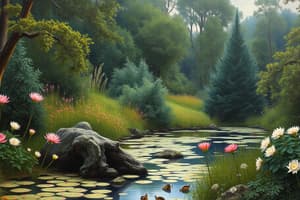Podcast
Questions and Answers
What is the term for the non-living factors in an ecosystem?
What is the term for the non-living factors in an ecosystem?
- Abiotic components (correct)
- Marine ecosystems
- Terrestrial ecosystems
- Biotic components
What is the process by which plants convert sunlight into energy?
What is the process by which plants convert sunlight into energy?
- Conservation
- Photosynthesis (correct)
- Water cycle
- Weathering and erosion
What is the term for the preservation and protection of natural resources and ecosystems?
What is the term for the preservation and protection of natural resources and ecosystems?
- Climate change
- Biodiversity
- Conservation (correct)
- Pollution
What type of ecosystem includes rivers, lakes, and wetlands?
What type of ecosystem includes rivers, lakes, and wetlands?
What is the term for the release of harmful substances into the environment?
What is the term for the release of harmful substances into the environment?
What is the importance of nature in terms of human health?
What is the importance of nature in terms of human health?
Flashcards are hidden until you start studying
Study Notes
Definition of Nature
- Nature refers to the natural world, including all living and non-living things, such as plants, animals, landscapes, and weather patterns.
Components of Nature
- Biotic components: living organisms, including plants, animals, fungi, and microorganisms.
- Abiotic components: non-living factors, including water, air, soil, sunlight, temperature, and natural disasters.
Types of Ecosystems
- Terrestrial ecosystems: forests, grasslands, deserts, and tundra.
- Freshwater ecosystems: rivers, lakes, and wetlands.
- Marine ecosystems: oceans, coral reefs, and estuaries.
Natural Processes
- Water cycle: the continuous process of evaporation, condensation, and precipitation.
- Weathering and erosion: the breakdown and transportation of rocks and soil by natural forces.
- Photosynthesis: the process by which plants convert sunlight into energy.
Human Impact on Nature
- Pollution: the release of harmful substances into the environment, affecting air, water, and soil quality.
- Climate change: the warming of the Earth's atmosphere, primarily caused by human activities.
- Conservation: the preservation and protection of natural resources and ecosystems.
Importance of Nature
- Provides resources: food, water, air, and raw materials.
- Supports biodiversity: a variety of plant and animal species.
- Influences human health: through air and water quality, and access to natural spaces.
Definition and Components of Nature
- Nature encompasses the natural world, including living (biotic) and non-living (abiotic) components.
- Biotic components consist of plants, animals, fungi, and microorganisms.
- Abiotic components include water, air, soil, sunlight, temperature, and natural disasters.
Types of Ecosystems
- Terrestrial ecosystems comprise forests, grasslands, deserts, and tundra.
- Freshwater ecosystems consist of rivers, lakes, and wetlands.
- Marine ecosystems include oceans, coral reefs, and estuaries.
Natural Processes
- Water cycle: evaporation, condensation, and precipitation occur continuously.
- Weathering and erosion: rocks and soil break down and are transported by natural forces.
- Photosynthesis: plants convert sunlight into energy through this process.
Human Impact on Nature
- Pollution: harmful substances released into the environment affect air, water, and soil quality.
- Climate change: human activities primarily cause the warming of the Earth's atmosphere.
- Conservation: preserving and protecting natural resources and ecosystems.
Importance of Nature
- Nature provides resources: food, water, air, and raw materials.
- It supports biodiversity: a variety of plant and animal species exist.
- Nature influences human health: through air and water quality, and access to natural spaces.
Studying That Suits You
Use AI to generate personalized quizzes and flashcards to suit your learning preferences.





